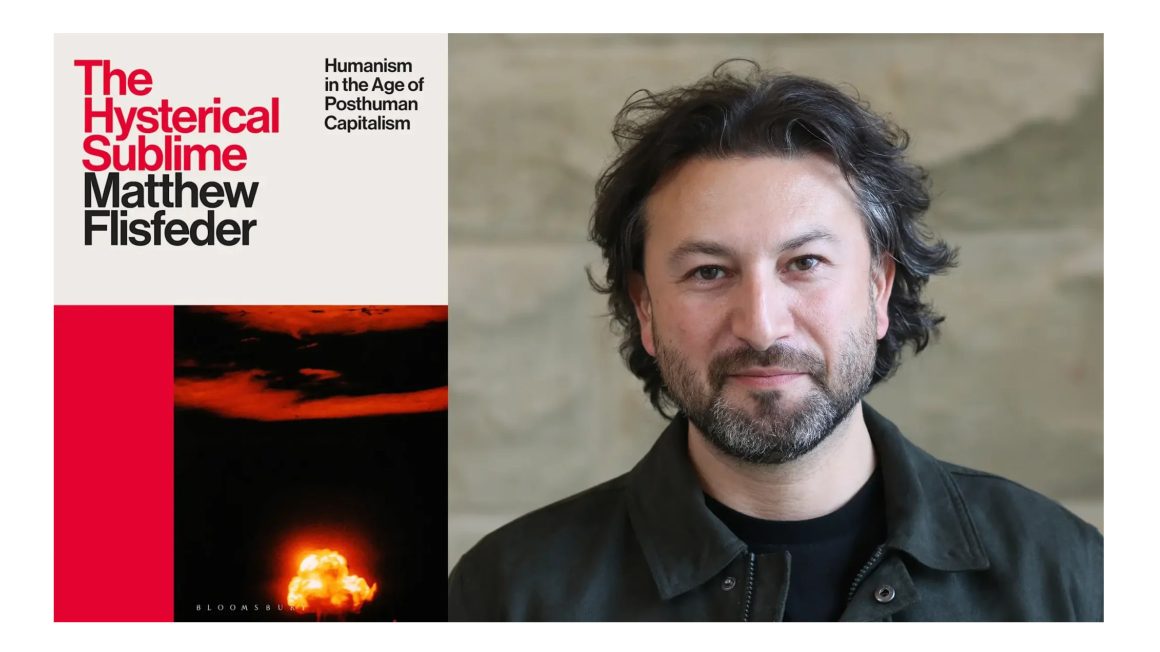Dr. Matthew Flisfeder, a professor in the Department of Rhetoric, Writing, and Communications at the University of Winnipeg, is releasing a new book titled, The Hysterical Sublime: Humanism in the Age of Posthuman Capitalism (Bloomsbury 2025), available on July 24.
Research for his latest book builds on his previous work which explores social media platforms as a case study in understanding the ideology of contemporary neoliberal capitalism. Through his research, he discovered that much of the literature on contemporary posthumanist literature grapples with two sets of overlapping problems: the impact of media infrastructures on the environment and climate change, and the impact of new media and digital automation on human labour.
Dr. Flisfeder says these issues often coalesce around a concept of the Anthropocene – a proposed geological term for a period of history where humanity and human culture and civilization is having an impact on the geological formation of planet Earth.
“A lot of the criticism of the Anthropocene is turning towards the human or the human subject as the cause of both our climatological and technological problems today,” explained Dr. Flisfeder. “The problem with that for me was that on the one hand, blame is being put onto the human, but at the same time, it is only human subjects that are capable of helping with these problems.”
With his book, Dr. Flisfeder proposes a new way of looking at humanism. He uses the term “the hysterical sublime,” originally coined by the influential American literary scholar Fredric Jameson, to refer to the sense of awe, fear, fascination, and anxiety we feel when we see the impacts of technology.
However, for Dr. Flisfeder, the hysterical sublime distracts us from the real issue, which is how capitalism shapes our relationship with technology and nature.
It is only humanity that can save us, not anything else.
Dr. Matthew Flisfeder
“The political goal of the book is to revive the concept of humanism that gives priority to human culture and civilization as a way of challenging the problems that have been developed both in terms of climate change and the impacts on human labour by human subjects themselves. So that it is only humanity that can save us, not anything else.”
Dr. Flisfeder says the concept of the Anthropocene and posthumanism have gained prominence and notoriety in Humanities disciplines. Humanity and human culture and civilization is not the root of our problems. Rather it is the way capitalism organizes humanity’s relationship to nature.
“I’m not here to blame humanity,” said Dr. Flisfeder. “And my criticism is not of technology, but rather the way that technology is used not just to serve human needs, but to serve the needs of capital. I want to see technology augmenting the conditions required for improving human needs. How can we change the conditions of production in our society to serve human needs and change the relationship we have to nature based on the conditions we have today.”
World-renowned philosopher Slavoj Žižek has endorsed Flisfeder’s new book, saying, “Flisfeder’s book is the rare case of a work which appears at the right moment doing the right thing.” Žižek spoke at UWinnipeg in 2019 as part of the UWinnipeg Axworthy Distinguished Lecture Series.
The hardback edition of The Hysterical Sublime: Humanism in the Age of Posthuman Capitalism will be available for purchase later this month. A book launch and paperback release will be scheduled for 2026.





